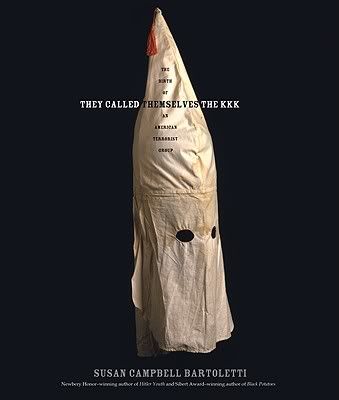
This richly documented, historically contextualized account traces the origin and evolution of the Ku Klux Klan from a small mischievous social club into a powerful, destructive organization. With compelling clarity, anecdotal detail, and insight, Bartoletti presents the complex era of Reconstruction, 1865-1877, that gave rise to the KKK. After the Civil War, the defeated South was a simmering cauldron of political, economic, and social instability. As the federal government struggled to provide law and order and to protect the rights of freed slaves, secret groups of Southern whites banded together to vent their anger over lost property, prosperity, and power. From six men in a law office in Pulaski, TN, KKK dens spread across the South targeting freed blacks and their supporters. Although the Ku Klux Klan Act of 1871 was meant to end violence, KKK activity persisted through the 20th century, diminishing in the last 30 years as civil rights became a reality for all Americans.
(Amazon.com)
Genre: non-fiction, history
Rating: 5/5
Aimed specifically at teenagers, this book is brilliantly researched and laid out. Bartoletti accomplishes the very difficult by not letting opinions color the research. She never comes out talking about how horrible the KKK is, she simply lets their actions and the research speak for itself. So often non-fiction aimed at children seems to want to tell them what to think about events or issues. This book never tries to say "you should hate the KKK because...", rather, through personal accounts, meticulous research and drawings from the time period it allows the reader to form their own opinion. This book should make the reader angry. The injustice that was allowed to be perpetuated against the freedmen during Reconstruction should make any sensible person want to rage. Bartoletti wisely never tells you want to think, but lays out her case so well that there are no other options than outrage.
This book is exceptional for school libraries. It's not graphic, as some non-fiction dwelling on a violent topic get into, but it's so well written that it doesn't have to be. Laid out like a court case, the information is presented to be judged and hopefully learned from.
No comments:
Post a Comment